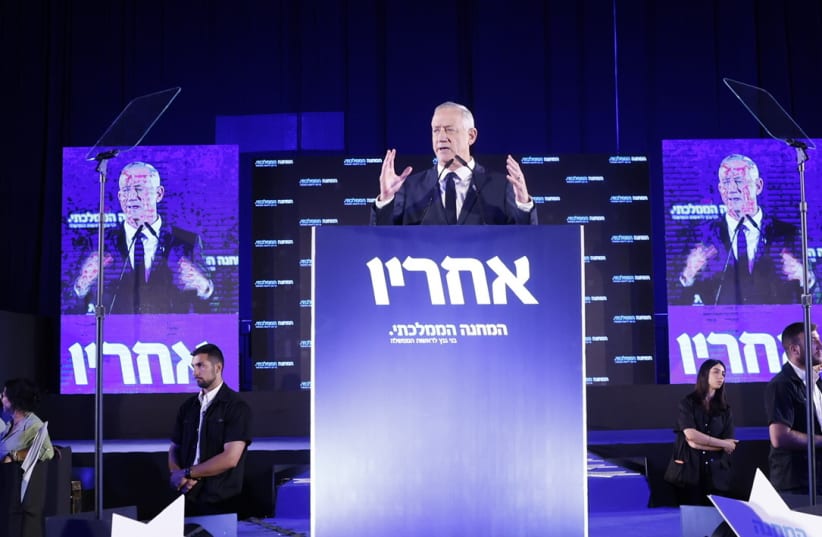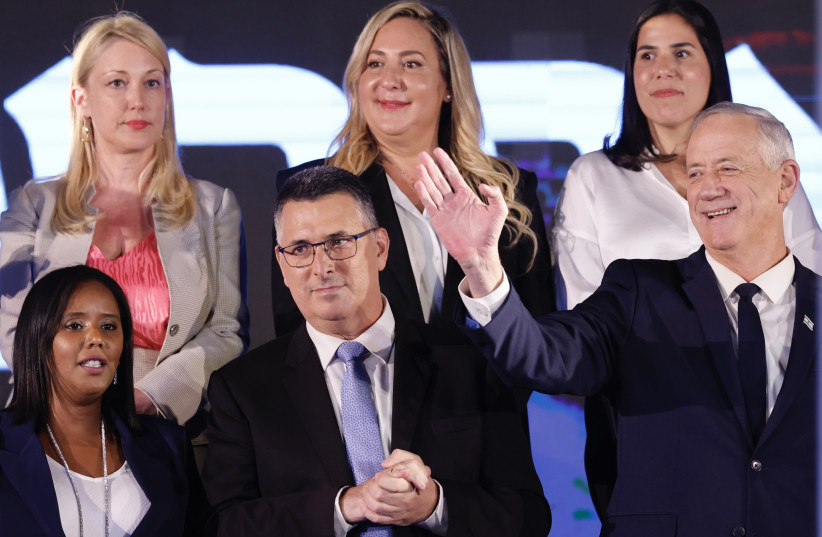The National Unity Party’s official campaign slogan and banner revealed at a festive event at the Tel Aviv Expo on Tuesday night features the image of party leader and Defense Minister Benny Gantz looking off into the distance with the word “Aharav,” or “After Him,” written in white.
The slogan is a spinoff of a famous motto in Israel, “Aharai,” or “After me,” which IDF commanders’ courses teach from day one. An Israeli commander is expected to lead from the front, not from behind.
The slogan is a clear reference to Gantz’s illustrious military career, which he finished as chief of staff and which in Israel always attracts voters. It also emphasizes that Gantz and his party view him as a contender for the premiership, and therefore the equal of Likud’s opposition leader Benjamin Netanyahu and Yesh Atid’s Prime Minister Yair Lapid.
Gantz’s centrality also played prominently throughout the event itself.
Gantz’s entry included exploding firecrackers, a full three minutes of pounding music, and the exit of all the other party members who were called up to the stage before him and clapped enthusiastically during his lengthy entry onto the stage.
Prior to his entry, a video was shown of him in action as a commander and then as a politician, complete with uplifting background music and superlatives extolling his virtues.
Gantz’s figure, his prominence in the event and the party’s slogan and banner are an awkward choice for two main reasons.
Why is Gantz's prominence awkward?
First, despite his military career, Gantz does not have the charisma of his competitors. His media performances have improved gradually over time, but he still does not interview well and often seems tired and disengaged. Focusing solely on him and his traits could end up serving the other side, and the obvious attempt to construct a rock-star entrance did not suit him.
Second, National Unity, as well as other coalition parties, often criticize the Likud for its “worship” of their party leader. The Gantz banner, however, was quite similar to Netanyahu banners, and the rhetoric extolling him was not unlike that of the Likud MKs’ gushing praise of its leader. If National Unity intends to stress that Netanyahu is not a team player and holds himself above his peers, why grant Gantz the same status?
In his speech, the party’s number two, Gideon Sa’ar, predictably praised Gantz and argued that the defense minister was the only prime ministerial candidate who could bring together parties from both sides. However, Sa’ar went against the tone of the campaign event, which focused on Gantz alone and spoke of Gantz as a team player.
“A leader of leaders is a person confident enough in himself and in his leadership to surround himself with a strong team; a team that has the capacity to deal with the large and pressing national issues,” Sa’ar said. “Benny Gantz is a leader of leaders. He is the most fitting leader of Israel today.”
"Benny Gantz is a leader of leaders. He is the most fitting leader of Israel today."
Gideon Saar
If Gantz indeed is a “leader of leaders,” the party would be wise to broaden its focus and include the many other “leaders” on its team. These include Sa’ar, Gadi Eisenkot, Housing Minister Ze’ev Elkin, Education Minister Yifat Shasha-Biton, Aliyah and Integration Minister Pnina Tamano-Shata, Science and Technology Minister Orit Farkash Hacohen and former Religious Affairs minister Matan Kahana.
All of the above have impressive records, and many of them have more fire and charisma than their leader.
At upcoming events, instead of imitating the Likud, and, to a lesser extent, Yesh Atid's "loyalty to the leader" culture, National Unity would be wise to differentiate itself from its larger competitors and emphasize the strength of its team.

